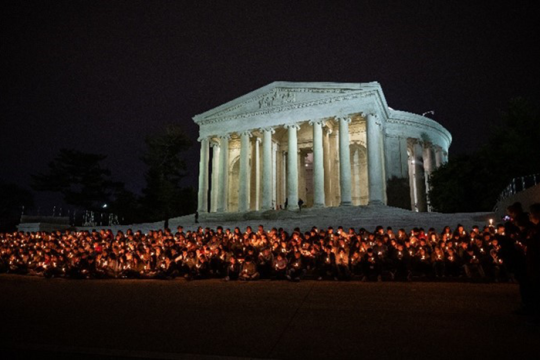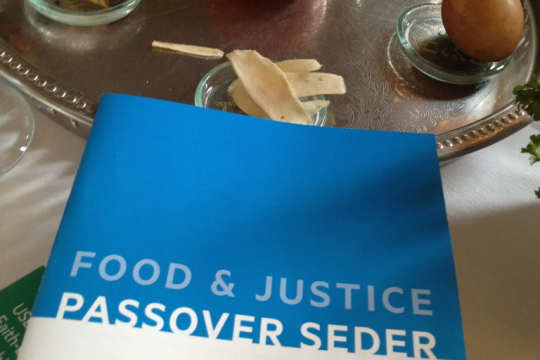By Isabella Merritt
As I sat in Congressmen Jim McDermott's office waiting to meet him, I was extremely nervous. I was about to have a meeting with someone who had served my district for 26 years to ask if he would speak to students at American University about the importance of fighting malaria. This was a big deal. Before I moved to Washington D.C. I had no idea I would ever set-up a meeting with a member of Congress. This meeting would have never happened if it wasn't for my fellowship with the United Nations Foundation Nothing But Nets campaign and the Religious Action Center. Over the past year and a half, my fellowship with these two organizations has evolved from an extracurricular activity to a true passion.
Nothing But Nets is a malaria prevention organization that is dedicated to sending insecticide-treated bed nets to refugee communities in Sub-Saharan Africa. It engages young kids, college students and adults in the effort to prevent a disease that kills a child under five every 60 seconds. I was shocked when I first heard that statistic. How can we as a society invest resources into extracting oil that is destroying our planet, but not invest enough money into a disease that kills 600,000 people a year? I was puzzled. As a Reform Jew I grew up with the value of Tikkun Olam (repairing the world) and when I heard about the severity of malaria I felt driven to utilize all my resources to join the fight.
I may have been motivated to work for the Nothing But Nets campaign, but not many other college students had the same feeling. My task of inspiring other driven college students to care about an issue that may never affect them was daunting. As a fellow, I needed to figure out a way motivate students like myself to care about an issue that mattered so much to me. Once I took this task on, I realized how many other issues intersect with malaria prevention.
Malaria is an issue that can be discussed in terms of economic, health, and environmental concerns. Parents often miss work because their children are sick with malaria and cannot go to school, which can lead to lower incomes for families. Malaria is caused by one mosquito bite. There are regions in the world where the climate is becoming warmer leading to more humidity in the air and the higher humidity and standing water creates a perfect breeding environment for mosquitos. No matter if a student cares about economic inequality, global health or environmental issues, I was able to show them that they could find a reason to care about malaria too.
Given the broad scope of issues with which malaria intersects, I was able to host multiple events for Nothing But Nets and the Religious Action Center on American University's campus. My biggest event with the fellowship was my most recent event with Congressmen Jim McDermott (WA-D). It was co-sponsored by AU College Democrats, Amnesty International at American University and Eco-Sense, which is the environmental club on campus. After a year and a half of advocacy meetings, a basketball tournament, a restaurant fundraiser and themed Shabbats, I was able to build a big enough of a base to bring a politician to campus.
This event and my work during my time as a fellow has shown me how to turn passion into action. Before this fellowship I did not know a single fact about malaria but now I am able to sit in a meeting with a respected politician fully confident in my knowledge about this issue. And, I have seen how my strong Jewish values and connection to social justice can help bring about change in communities in Washington, D.C., and across the world.
Isabella Merritt is a sophomore at American University in Washington but she is originally from Seattle, WA. She is majoring in International Service with a concentration in Environmental Sustainability and Global Health. Isabella has been a fellow with the United Nations Foundation Nothing But Nets and the Religious Action Center for a year and a half. In addition to being a fellow with the Religious Action Isabella has been involved with the other URJ programs such as NFTY and URJ Camp Kalsman.
Related Posts
Image

Why is this Right Different?: City of Grants Pass, Oregon v. Johnson and the Passover Call to Action
As families prepare for the Passover seder and its celebration of freedom, the Supreme Court will hear a case in which the basic civil rights of unhoused people are at stake.
Image

Highlights from the 2023-2024 L'Taken Season
Another incredible L'Taken season has come to a conclusion! Over the 2023-2024 season, we had over 1,300 Jewish high schoolers from across North America join us in Washington, D.C. over our four weekends.
Image

Passover 2024: The Three Central Messages of Pesach
The Exodus story is the master narrative of the Jewish people. As most of us know, it tells the story of the Hebrew slaves in Egypt and the rise of Moses as their liberator. It reminds us that in 2024, the universality of Passover's three-part message again reverberates through the generations: freedom, love, and justice.